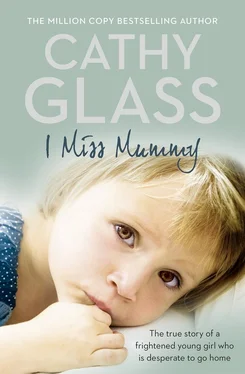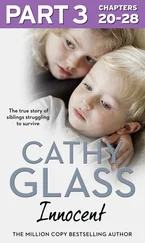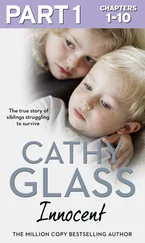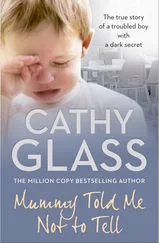‘Yes, of course, bring her straight to me,’ I confirmed; then, unable to resist a dig: ‘I don’t really work to office hours, Jill.’
‘No, I know, but you know what I mean.’
‘Yes. Hopefully the police will find her soon.’
‘I hope so,’ Jill said. ‘The poor child will be upset enough already at having to come into care without all this.’
Deep in thought, I returned to the kitchen and the dinner I was preparing, which was now running late.
Adrian appeared, his stomach growling. ‘When’s dinner ready, Mum?’
At fourteen, my son was continuously hungry, and growing upwards at an quite a rate. He was already four inches taller than me, and he was going to be six foot, like his father – who unfortunately no longer lived with us.
‘About half an hour till dinner,’ I said. ‘Have an apple if you’re hungry.’
He nodded, and took an apple and banana from the fruit bowl, and a packet of crisps from the cupboard.
‘I hope that’s not going to spoil your appetite,’ I called after him, envious. I couldn’t have eaten all that and dinner without putting on weight. There was no answer, but I knew the snack wouldn’t spoil his appetite. Adrian never left his food, unlike Lucy, my twelve-year-old foster daughter who picked at her food.
Presently Paula, my ten-year-old daughter, came into the kitchen and began foraging for food.
‘No, leave the biscuits,’ I said. ‘Dinner will only be fifteen minutes.’
‘Adrian’s got crisps,’ she said accusingly.
‘I know, and you can have a packet after dinner, if you’re still hungry. Although fruit would be better.’
She pulled a face but left the biscuit tin untouched in the cupboard. ‘Isn’t that little girl coming?’ she asked, suddenly remembering that I’d said Alice would be with us for dinner.
‘Hopefully later,’ I said. ‘She’s been delayed.’
Paula looked at me questioningly and, while I didn’t want to burden her with my anxiety about Alice’s safety, I knew I had to give her some explanation. ‘Alice is with her mother,’ I said, ‘and the social worker isn’t sure where they are.’
Paula pulled another face, unimpressed. ‘How can they be lost?’
‘They’re not lost, just temporarily misplaced,’ I said lightly, and changed the subject. Paula can be a real worrier when it comes to little children, even worse than me. ‘Could you pop up to Lucy’s room and tell her dinner is ready? If she says she’s not hungry, tell her I’d like her to come down and join us anyway. Thanks, love.’
Lucy had been with us for nearly a year and, having lived with countless aunts and cousins and never had a proper family of her own, she’d settled into our family remarkably quickly, welcoming the stability and routine. However, while I was very pleased with her progress, both at home and school, my biggest concern remained with her eating. She was an attractive girl, her long black hair and dark eyes coming from her father, who was Thai, but she was slim to the point of thin. At 5 feet 4 inches, she weighed only six and half stone and whereas when she’d first arrived I’d assumed she would put on weight once she’d settled into our family, she hadn’t.
I’d mentioned my concern to Jill and also to Lucy’s social worker, who in turn had taken advice from the looked-after children’s nurse who is employed by the council to advise on the health of children in care. On her advice I was now monitoring (as far as I could) what Lucy ate, and also her weight, keeping my supervision very low key so it didn’t become an issue. There was no evidence that Lucy was making herself sick after eating, or pretending to eat and then throwing the food away, so we were optimistic that she wasn’t suffering from an acute eating disorder such as anorexia or bulimia. But over the last four months since I’d started monitoring Lucy she hadn’t put on any weight but had grown in height, which in real terms meant she’d lost weight. According to the height/weight chart the nurse had used, Lucy should have weighed eight stone, so she was one and a half stone (twenty-one pounds) underweight, which was obviously very worrying.
However, I was pleased to see that Lucy came downstairs with Paula for dinner. At the same time Adrian returned to the kitchen for an update on dinner.
‘It’s ready,’ I announced. ‘Sit down.’
I began dishing up while the three of them sat at the table in what we grandly call the breakfast room – the term used by the architect who drew up the plans for what is really an extension to the kitchen. Having plated up some of the casserole for Alice and left it to one side, I carried the other plates over to the table. All that could be heard for some time was the chink of cutlery on china. As we ate I was half expecting the phone to ring – the social worker telling me Alice had been found and they were on their way – or even the door bell to ring, if they came straight to me.
As we ate I was also watching Lucy out of the corner of my eye for, as often happened, she had begun well, eating four mouthfuls straight off as though she was ravenous, and then ground to a halt; she was now toying with her food. When Lucy had first arrived, I had told her, as I tell all children at their first meals, to eat what she wanted and leave what she didn’t want, but when I’d realized just how little she was eating I’d started to encourage her: ‘Can’t you just eat half of it?’ ‘Another couple of mouthfuls?’ ‘Just the mashed potato?’ I didn’t know if I was doing the right thing, but as every mother knows it is excruciating to watch a child eating insufficient for their body’s needs.
‘Did you have lunch?’ I asked Lucy as she continued to fork her food around the plate. I gave her money for lunch every day, but her secondary school ran a cafeteria system, so I’d no idea what, if anything, she’d bought or eaten.
‘Yes,’ she said as she usually did. ‘I had a sandwich.’ Which, as usual, I had to believe. But even if she had bought a sandwich and eaten all of it, her day’s food intake was still very small and barely sufficient to maintain growth and health: a thin slice of dry toast for breakfast, a sandwich for lunch and now a few mouthfuls for dinner.
Lucy toyed with her food for a bit longer; then she laid her knife and fork on her plate, having finished. Paula laid down her knife and fork too, on a clean plate, and Adrian was looking for pudding.
‘Are you sure you’ve finished?’ I asked Lucy. She nodded, and I collected the plates. ‘I’ve just got to make the custard,’ I said and, leaving the three of them at the table talking about a television programme, I returned to the kitchen. I boiled the kettle and made instant custard; then I poured it into a jug and placed it on the table with a shop-bought apple pie. I told them to help themselves and surreptitiously watched Lucy take a small amount of custard but no pie. Then the phone rang and I jumped up from the table and went into the sitting room to answer it, fervently hoping it was Martha, Alice’s social worker, phoning to say Alice had been found, safe and well, and they would be with me shortly.
It was Martha, but without good news. ‘Nothing,’ she said. ‘Alice and her mother have completely disappeared. The police have searched all the addresses of friends and family we have given them, so I really don’t know where they can be.’ She sounded very weary. ‘I’m off duty soon, but I shall be leaving my mobile on all night and the police have instructions to call me directly when she’s found. Jill said it was all right to bring Alice to you, even it it’s in the middle of the night.’
‘Yes, of course. I’m a light sleeper – I’ll hear the phone or the door.’
Читать дальше












